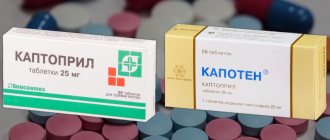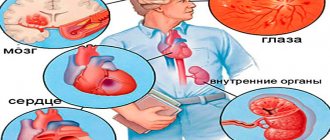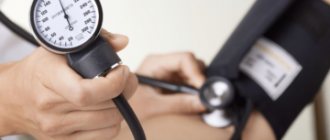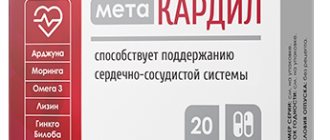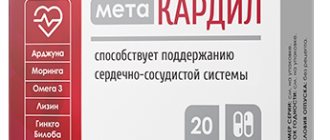High blood pressure requires mandatory treatment, as it can lead to a hypertensive crisis and other complications that are easier to prevent than to treat. One of the effective drugs for eliminating the symptoms of hypertension are Capoten blood pressure tablets. Their main advantages over other medications are a rapid but gentle reduction in blood pressure, minimal risk of side effects, and an affordable price.
The earlier treatment for hypertension is started, the more effective it will be. You should seek medical help after the first symptoms of the disease appear. These include the following signs:
- changes in blood pressure;
- headache;
- dizziness;
- increased sweating;
- feeling of chills;
- the appearance of characteristic black “flies” before the eyes;
- increased heart rate;
- swelling;
- ·impaired visual acuity;
- constant fatigue, apathy, drowsiness.
After the examination, the doctor will draw up an optimal treatment regimen, which includes medications that gently and carefully reduce blood pressure. For example, Kapoten. How exactly does the medication work and what features does it have? What are the contraindications and indications for use?
Important! The main question that hypertensive patients ask is how long it takes for the remedy to work. The expected hypotensive effect of Capoten with high blood pressure manifests itself 60–90 minutes after consumption. Whether the patient lies, sits or stands – it doesn’t matter.
Release form, pharmacokinetics
Capoten is available in the form of tablets of 25 mg or 50 mg. The package may contain 28, 40, 56 tablets (10 or 14 in one cellular blister).
The active component of the antihypertensive drug is captopril. It is an ACE inhibitor (angiotensin-converting enzyme) that suppresses the formation of angiotensin II.
In addition to captopril, the drug also contains auxiliary ingredients. These are corn starch, lactose, stearic acid, MCC.
Medicines from this pharmacological group have a vasoconstrictor effect on both arterial and venous vessels. Capoten lowers pressure in the pulmonary circulation, as well as in the right atrium, reduces post- and preload, and reduces the release of aldosterone in the adrenal glands.
No ads 1
What is Capoten and why should you take it?
Capoten is used to treat diseases such as:
- Arterial hypertension (essential and secondary)
- Chronic heart failure (CHF)
- Damages of the glomerular apparatus of the kidneys in diabetes (nephropathy)
- Post-myocardial infarction
One Capoten tablet contains 25 or 50 mg of Captopril, the active substance. In the group of ACE Inhibitors, Capoten analogues exist in large quantities, produced by different manufacturers. The drugs differ slightly in their chemical formula, for example - Berlipril, Liquinopril, Enap, Accupro, Quinafar. If desired, you can choose the cheapest and most accessible substitute, since they will work equally effectively.
Indications and contraindications
Doctors recommend taking Capoten for high blood pressure with the following diagnoses:
- arterial hypertension at any stage of the disease;
- heart failure;
- nephropathy due to diabetes mellitus;
- disturbances in the functioning of the cardiac left ventricle due to a heart attack.
Capoten is not prescribed during pregnancy and lactation
The list of absolute contraindications is much wider, namely:
- age under 18 years;
- angioedema, congenital or acquired after taking ACE inhibitory drugs;
- severe hepatic and renal disorders;
- stenosis of arterial renal vessels;
- conditions that complicate the outflow of blood from the left cardiac ventricle;
- sensitivity to captopril or other components of the drug, for example, lactose.
In some cases, contraindications are relative. Then the drug is prescribed with increased caution and individual dose adjustment. These conditions include:
- cerebral ischemia;
- IHD;
- diabetes;
- autoimmune connective tissue pathologies;
- depressed bone marrow hematopoiesis;
- hyperaldosteronism in the primary form;
- being on hemodialysis;
- elderly age;
- salt-free diet;
- liver and kidney diseases;
- heart failure.
Taking certain medications and general anesthesia are also among the relative contraindications to the treatment of hypertension with Capoten. If Capoten is used for contraindications, situations are possible when the medicine does not help, as well as the development of various side effects.
When Kapoten doesn't help
Some hypertensive patients who have self-prescribed treatment with this drug note its ineffectiveness. This is due to the fact that the medicine is not universal and is unable to cope with surges in blood pressure in some cases. The question of why Capoten does not reduce blood pressure may arise if hypertension is caused by:
- A stressful situation when adrenaline begins to be produced, which does not constrict blood vessels in the heart and brain. The blood pressure medicine Capoten is designed to prevent the production of oligopeptides that work specifically in these organs.
- Increased heart rate. In this case, Capoten does not work, since it does not affect the heart muscle.
- Diseases of internal organs - gastrointestinal tract, kidneys, adrenal glands.
Important! Considering that Capoten reduces blood pressure only in certain diseases, you should consult your doctor before starting to take the drug.
Sometimes the effectiveness of Capoten decreases with long-term use. The reason is the effect of addiction to the active substance of the drug. The body begins to require increasingly larger doses of Captopril, and over time it stops responding to them. This situation is dangerous because if a hypertensive crisis occurs, blood pressure cannot be brought down even with stronger drugs.
In this case, the doctor should draw up a treatment regimen in which the dose of Capoten is carefully reduced. It is impossible to abruptly cancel the drug, as this can lead to irreparable consequences caused by “withdrawal syndrome”. Most often, Capoten begins to be combined with other antihypertensive drugs, gradually eliminating the drug that is no longer able to effectively reduce blood pressure.
Advice! You can avoid addiction by alternating the use of Capoten with other medications to lower blood pressure, for example, from the group of diuretics or blockers. The choice of medications is possible only under the strict supervision of a doctor; doing this on your own is dangerous to your health.
No ads 2
How does the hood reduce pressure?
Capoten inhibits the activity of ACE, which cannot convert angiotensin-I into angiotensin-II, a substance with a strong vasoconstrictor effect. This drug also suppresses the secretion of Aldosterone hormone by the adrenal cortex, as a result of which excess sodium and water are removed from the body. By acting on the vascular wall, the medication stimulates the production of nitric oxide, which acts like Nitroglycerin - dilates the arteries. Blood pressure is reduced by reducing peripheral vascular resistance. In addition, there is an increase in cardiac output and a decrease in pressure in the right atrium and pulmonary circulation.
With long-term use of the drug, the thickness of the muscle wall and the volume of the cavity of the left ventricle are reduced, and the development of heart failure is also prevented.
By acting on the kidneys, Capoten slows down the development of diabetic nephropathy.
Treatment regimen
How exactly to take Capoten with high blood pressure is decided by the doctor individually. The following treatment regimens are currently used:
- the initial stage of hypertension - take 1 tablet per day, dividing it into 2 doses (12.5 mg each);
- advanced form of arterial hypertension - drink 1 tablet (25 mg) twice a day;
- hypertensive crisis - place 1 tablet under the tongue, repeat sublingual administration of the drug after half an hour, be sure to call an ambulance.
During treatment, they undergo regular examinations to monitor how much Capoten reduces blood pressure and whether any adverse reactions occur.
If necessary, the dose of the drug is increased to achieve maximum effect. This is done very slowly so as not to cause side effects and complications. At what pressure to take, to increase the dose that can be taken per day, and at what pressure to stop taking the medicine, you must also agree with a specialist.
In case of heart failure, kidney failure, heart attack, diabetes mellitus, Capoten for blood pressure is recommended to be used as an element of complex therapy. The dosage, duration of treatment, and the interval between taking tablets are determined by the doctor, focusing on the patient’s current condition and medical history.
Elderly patients, as well as people with relative contraindications at the initial stage of treatment are recommended to drink ¼ tablet - 25 mg (6.25 mg each) twice a day. In these cases, the drug that reduces blood pressure is usually combined with diuretics (non-thiazide series).
Important! Capoten, like other ACE inhibitors, is incompatible with activities requiring increased concentration. During its use, especially at the initial stage of treatment, you should avoid driving vehicles and working with high-precision equipment.
Possible side effects
As with other medications, adverse reactions to the drug may occur after Capoten. Among them, as evidenced by reviews from doctors and their patients, the following can be noted:
- The cardiovascular system may respond to Captopril with arrhythmia, tachycardia, angina pectoris, arterial hypotension, peripheral edema, Raynaud's syndrome, pallor or flushing of the face. In exceptional cases, cardiogenic shock or cardiac arrest may develop.
- From the respiratory system, adverse reactions such as shortness of breath, dry cough, rhinitis, pneumonitis, bronchospasm or pulmonary edema are possible.
- The central nervous system reports a negative reaction to Capoten with dizziness, insomnia or drowsiness, headache, ataxia, paresthesia, confusion, visual impairment and cerebral circulation, even stroke or syncope.
- Some patients experience allergic reactions in the form of skin rashes, itching, alopecia, and angioedema.
- Reactions from the hematopoietic system are expressed in the form of neuropenia, pancytopenia, agranulocytosis, anemia, thrombocytopenia, eosinophilia, lymphadenopathy, autoimmune disorders, increased titers for antinuclear antibodies.
- From the digestive system, the following manifestations are possible: abdominal pain, nausea, vomiting, loss of taste, diarrhea, constipation, dry oral mucosa, irritation of the gastric mucosa, dyspepsia, stomatitis, anorexia, pancreatitis, liver disorders, gum hyperplasia, glossitis, ulcers stomach.
- The urinary system reacts to Capoten's use with renal dysfunction, frequent urination, polyuria, and nephrotic syndrome.
- Other side effects include arthralgia, myalgia, gynecomastia, impotence, weakness, asthenia, hyperthermia, and chest pain.
In rare cases, taking Capoten also has a negative effect on laboratory parameters. The drug increases the amount of creatinine and bilirubin in the blood. The levels of nitrogen and urea increase, proteinuria, hyperkalemia, hyponatremia, eosinophilia, and hypoglycemia occur. There is a decrease in the level of leukocytes, platelets and hemoglobin.
Important! As a rule, side effects occur when there is intolerance to the components of the drug or non-compliance with the dosage recommended by the attending physician and the instructions for the drug. If you take Capoten correctly, listening to medical recommendations, negative reactions are extremely rare.
No ads 3
What side effects are there from taking capoten?
| Heart and blood vessels | A short-term drop in pressure, rapid heartbeat, which is restored when the patient assumes a horizontal position. This is a normal physiological reaction that does not require treatment. |
| Lungs and airways | Dry cough, coughing is the most common “symptom” of taking Captopril |
| Kidneys | The appearance of signs of renal failure - protein, urea nitrogen and creatinine in the urine. |
| Allergic reactions | Urticaria, flushing of the face due to vasodilation, redness. Rarely, vascular edema of the face and extremities is possible. |
| Digestion | Changes in taste, dry mouth, inflammation of the mucous membrane of the gums and cheeks. There are rare cases of inflammation of the pancreas and cholestatic jaundice. |
| central nervous system | Headache, drowsiness and insomnia, paresthesia (feeling of goosebumps running over the skin, tingling in different parts of the body). |
| Electrolyte disturbances | Hyperkalemia (with concomitant renal failure), hyponatremia (if the patient adheres to a salt-free diet). |
In case of overdose, a pronounced decrease in pressure, shock, electrolyte imbalance and acute renal failure occur.
Interaction with medications
Capoten acts quickly and effectively copes with high blood pressure. But this is only possible with constant medical supervision. Moreover, the specialist must control not only the dosage of the drug, but also its compatibility with other drugs. During treatment, any additional medications should be reported to your doctor, who can reduce the dosage of Capoten or increase it for optimal effect. What medications can you take an antihypertensive drug with, and which ones can’t because of the high risk of side effects?
- The combination of Captopril with diuretics, vasodilators, ganglion blockers, alpha-blockers, hemodialysis or a salt-free diet can lead to an excessive decrease in blood pressure.
- The inclusion of anti-inflammatory non-steroidal drugs in the Capoten treatment regimen, on the contrary, reduces the hypotensive effect and worsens renal function.
- Potassium-sparing diuretics in tandem with Capoten can lead to hyperkalemia, and taking lithium drugs increases lithium in the blood serum.
- Captopril potentiates the hypoglycemic effect of medications taken by diabetics, which requires constant monitoring of blood glucose levels.
When taking certain medications simultaneously with Capoten, you should undergo regular tests to monitor the patient’s condition and reduce the dose of a particular drug in a timely manner. Self-prescription of medications during therapy, increasing permissible dosages can lead to various pathologies and even death.

